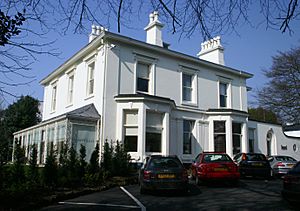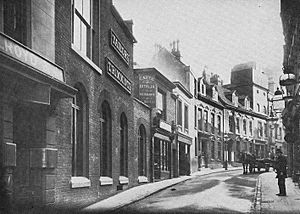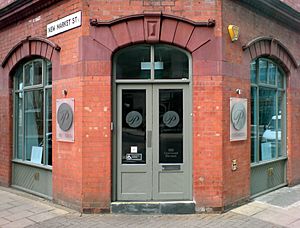Food and drink in Birmingham facts for kids
Food and drink have always been a big part of life in Birmingham, England. They are important for both business and culture in this large city.
Contents
Local Dishes
In the late 1700s, there were bad harvests in England. This made food very expensive. To help, soup kitchens opened to give cheap, healthy food to people who needed it. In 1793, a famous inventor named Matthew Boulton wrote down a recipe for a soup. This soup was meant to be sold for just a penny a quart! It was a hearty broth made with stewed beef and vegetables, served with a slice of bread. In 2014, a chef named Glynn Purnell brought this old dish back to life. He served a fancy version of it at his restaurant.
Another local dish is called "Brummie bacon cakes." These are made from flour, salt, butter, chopped bacon, and cheese. They also have Worcestershire sauce, ketchup, and milk. The mix is turned into a dough, sliced, and baked with more cheese on top.
The Balti is another dish that started in Birmingham. It came from Kashmiri restaurants in the 1970s. We'll learn more about it below!
Tea Time in Birmingham
In the 1830s, Thomas Ridgway started selling tea in Birmingham's Bull Ring area. He later went bankrupt but then started a new tea business in London. He paid back everyone he owed money to! By 1897, his company was one of the first in England to pack tea hygienically. This helped keep the tea pure and stop it from being mixed with other things. In 1876, Queen Victoria even asked Ridgways to create a special tea blend just for her.
Another famous tea company, Typhoo tea, also started in Birmingham. Its founder, William Sumner, opened a pharmacy and grocery store in 1870. His business grew so much that he had to move to bigger places. Typhoo tea is now owned by a large company from India.
Limes and History
Birmingham had early trade links with the West Indies. In the mid-to-late 1800s, the city started importing limes and cocoa.
The Montserrat Co. Ltd. was set up in Edgbaston by the J.& E. Sturge family. They produced lime juice in Birmingham. This juice was then sent out to make citric acid. At that time, Sicily's lemon crops failed, which created a big opportunity for Sturge. They used their large chemical factories in Edgbaston to make the most of this. The Sturge and Albright families helped fund lime farms in Montserrat in 1867. Joseph Sturge bought a sugar farm in 1857 and turned it into a lime production plant. He also wanted to show that businesses could be successful using free labor, not enslaved labor. Members of the Sturge family were very important in the movement to end slavery in Britain.
Famous Food Brands
Birmingham is the birthplace of many well-known food brands. These include Typhoo tea, Bird's Custard, Bournville cocoa, Cadbury chocolate, and HP Sauce.
Restaurants and Eating Out
The Old Crown public house is a very old building in Birmingham. It's a black and white timber-framed building that dates back to the 1400s. It has been an inn serving food and drinks since at least 1626. People tried to tear it down many times, but it was saved. It is still a popular pub today. The Saracen's Head in Kings Norton is from the same time period. It's now a visitor's center with a snack bar.
In the 1700s, a place called Freeth's Coffee House was a popular spot. It was a tavern and coffee house where small business owners and lawyers met. When John Freeth, a writer of topical songs, bought it, it became a place for people who supported new political ideas. They even had a "Birmingham Book Club" that met there for dinners.
Later, Ann Allday, the wife of a city council member, ran a famous tripe (a type of meat) restaurant and shop. Other council members often met there.
A more recent famous pub is The Garrison in Dale End. This pub was the inspiration for the pub in the TV show Peaky Blinders. The real pub was sold in 2014.
In 1896, one of England's first vegetarian restaurants opened in Corporation Street. It was owned by James Henry Cook. In 1898, a vegetarian hotel named after the famous vegetarian Sir Isaac Pitman opened in the same spot. It's said that Mahatma Gandhi ate at this restaurant when he visited Birmingham in 1931.
In the late 1800s, many Italians came to Birmingham. They often lived in streets near Digbeth. Many of them were street sellers. They sold the city's first ice cream, using leftover eggs and ice. Camillo Biglio opened a sweet shop in 1878. He is thought to have opened Birmingham's first Italian restaurant, Caffe D'Italia.
Birmingham has many different Asian restaurants that have served the city since the 1940s. The first Chinese restaurant, the Tong Kung, opened in 1956. By the late 1960s, places like The Old Happy Gathering offered more authentic Cantonese food.
In the early 1970s, Chinese businesses gathered around Hurst Street and Digbeth. Wing Yip opened the first Chinese supermarket. He built a large food business in Birmingham, now based in the Chinese Quarter.
In 1945, Abdul Aziz, one of the first immigrants from East Bengal (now Bangladesh), opened a cafe. It sold curry and rice in Steelhouse Lane. Police officers, lawyers, and barristers from nearby courts were his customers. This cafe later became The Darjeeling, Birmingham's first Asian restaurant. The second Asian restaurant was The Shah Bagh on Bristol Street. In 1957, Mozamel and Rachel Kazi changed their cafe, Rae's Cafe, to serve curry. It became so popular that they moved to a bigger place called Jinnah's. John Bonham, the drummer from Led Zeppelin, often ate there. The Kazis' son, John, even started home delivery and a takeaway service where customers brought their own pots to fill with curry and rice for 25p!
The Balti Story
The famous dish called balti was created in Birmingham in the 1970s. It was invented in restaurants owned by people from Pakistan, especially from the Mirpur area, who had moved to the city in the 1960s. When people who weren't Pakistani started visiting their restaurants, they wanted curries cooked faster than traditional Mirpuri dishes. So, the chefs developed new dishes. They cooked meat off the bone at higher temperatures in steel dishes. They used fresh, dried spices instead of curry pastes, and vegetable oil instead of traditional ghee (clarified butter).
The steel dishes used for cooking were called "baltis." This name is thought to come from the Hindi word "balty," meaning a bucket. The food was then served right in these steel dishes with naan bread.
The area where many balti restaurants were located became known as the Balti Triangle. This area is popular with tourists visiting Birmingham. The first time balti dishes were written about was in 1984. By 2016, there were about 50 balti restaurants in the Balti Triangle. In 1998, the balti restaurant owners formed the Birmingham Balti Association.
In the city center, there are other great South Asian restaurants. The Rajdoot in the Jewellery Quarter opened in 1966. It serves North Indian food. Famous people like The Beatles and The Princess Margaret have eaten there. The Maharajah, also serving North Indian food, opened in 1971. It was named Indian Restaurant of the Year in 1999.
Lasan, which opened in 2002, won "Gordon Ramsay's F Word Best Local Restaurant" award. Its chef, Aktar Islam, has appeared on BBC's Great British Menu three times.
Michelin Star Restaurants
The Michelin Guide is very famous for rating restaurants. Restaurants can earn "stars" for excellent food. In 1974, the Michelin Guide for Britain was published again after a long break. At that time, no restaurants in Birmingham had a Michelin star.
By the mid-1980s, Italian restaurants were still popular in the guide. But still, no Birmingham restaurants had a star.
By the early 2000s, British and French-style restaurants became very important in Birmingham's food scene. In 2005, Birmingham got its first two Michelin-starred restaurants: Simpson's and Jessica's.
By 2017, Birmingham had five Michelin-starred restaurants. This means Birmingham has more Michelin-starred restaurants than any other city in Great Britain, except London!
Here are some of the Michelin-starred restaurants in Birmingham:
| Restaurant | Chef | Cuisine | Location | Current | |||
|---|---|---|---|---|---|---|---|
| Year to star | |||||||
| Adams | Adam Stokes | Modern cuisine | City Centre | 2014– |
—
|
—
|
|
| Carters of Moseley | Brad Carter | Modern British | Moseley | 2015– |
—
|
—
|
|
| Jessica's | Glynn Purnell | Modern cuisine | Edgbaston | 2005–2007 |
—
|
—
|
Closed |
| Opheem | Aktar Islam | Indian cuisine | 48 Summer Row | 2020- |
—
|
—
|
|
| Purnell's | Glynn Purnell | Modern cuisine | City Centre | 2009– |
—
|
—
|
|
| Simpsons | Luke Tipping | Modern cuisine | Kenilworth, Warwickshire (1993-2004) Edgbaston (2004- ) |
1999– |
—
|
—
|
|
| Turners at 69 | Richard Turner | Modern British | Harborne | 2009–2018 |
—
|
—
|
Closed |
| Peel's Restaurant | Rob Palmer | Modern British | Hampton-in-Arden | 2015–2022 |
—
|
—
|
Closed |
| The Cross at Kenilworth | Adam Bennett | Modern British | Kenilworth | 2014– | – | – | |
Adam's
Adam Stokes opened "Adam's" with his wife Natasha in 2013. He had already earned a Michelin star at another restaurant in Scotland. "Adam's" was awarded a Michelin star in 2014. In 2017, it was named "Best Fine Dining Restaurant" in the Midlands. Adam Stokes also opened a second restaurant called "The Oyster Club" in 2019, specializing in fish and seafood.
Carters of Moseley
Carters of Moseley was opened in 2010 by chef Brad Carter and Holly Jackson. Brad studied at University College, Birmingham. His restaurant won the Good Food Guide Restaurant of the Year in 2015 and earned a Michelin star in 2016.
Jessica's
Chef Glynn Purnell used to be the chef at "Jessica's." It opened in 2003 and quickly won awards, including a Michelin star in 2005. Jessica's closed in 2007 when Glynn Purnell decided to open his own restaurant.
Purnell's
Glynn Purnell is a well-known chef who often appears on British TV food shows. He won the "Great British Menu" competition two years in a row (2008 and 2009). His restaurant, "Purnell's," opened in 2007 and was awarded a Michelin star in 2009. In 2016, Glynn Purnell was named Best Chef at the Birmingham Food, Drink and Hospitality Awards.
In 2018, Purnell created a special dish to celebrate the 50th anniversary of "Spaghetti Junction," a famous road interchange in Birmingham. His dish was made of potato and celeriac "spaghetti" with a creamy ginger sauce and truffle.
Simpsons

Andreas Antona opened the original Simpson's restaurant in Kenilworth in 1993, which earned a Michelin star in 2000. In 2004, he opened Simpson's Restaurant in Edgbaston, Birmingham, in a beautiful old building. Chef Director Luke Tipping has been a key part of Simpson's for a long time. Simpson's is known for its modern cuisine and has kept its Michelin star for many years. In 2018, PETA (an animal rights group) even listed Simpsons as one of the best restaurants in Britain for vegan food.
Turners at 69
Turner's Restaurant, later called "Turner's at 69," was opened by Richard Turner in Harborne in 2007. It earned a Michelin star in 2009. The restaurant focused on French and British food. In 2016, Richard Turner decided to make the restaurant more relaxed, changing its menu. After these changes, it lost its Michelin star in 2018 and closed in 2018.
Opheem
Aktar Islam's restaurant, Opheem, was awarded a Michelin star in October 2019. It serves modern Indian cuisine.
Peel's Restaurant
Peel's Restaurant opened in 2008. In October 2016, it was awarded a Michelin star. However, it closed permanently in December 2022.
Pop-Up Restaurants
In recent years, "pop-up" restaurants have become popular in Birmingham. These are temporary restaurants that chefs set up in different locations for a short time. This allows chefs to try out new ideas before opening a permanent place. Many successful chefs in Birmingham started with pop-up restaurants.
Street Food
Digbeth Dining Club, a weekly street food market, opened in August 2012. It has become a very popular place for people to enjoy different kinds of food from various vendors. It even hosted the British Street Food Annual Awards in 2016.
Food Events
Birmingham has a long history of food fairs. In the 1700s and 1800s, fairs and festivals were held in the Bullring. The most popular was the Onion Fair, which celebrated the onion harvest. It was a big event with stalls, shows, and amusements.
Today, the BBC Good Food Show takes place at The National Exhibition Centre. It is Britain's largest food event.
The Colmore Food Festival is held every July in Victoria Square. It showcases food and drink businesses in the area. Visitors can try food and watch local chefs, like Glynn Purnell, give cooking demonstrations.
Recently, there's been a growing interest in local food. This has led to more farmers markets and popular street food events in Birmingham.
In 2014, the Birmingham Independent Food Fair at Millennium Point highlighted local food businesses. It featured restaurants, food producers, and local brewing companies.
Food During COVID-19
On March 20, 2020, all restaurants, pubs, and bars in England, including Birmingham, had to close because of the coronavirus pandemic. This was to help stop the virus from spreading. They were allowed to reopen on July 4, 2020. In August, the government started a program called ‘Eat Out to Help Out’ to encourage people to eat out again by offering discounts.
Later, as COVID-19 cases rose, the government introduced a system of tiers. Birmingham was placed in different tiers, which affected how restaurants could operate. During lockdowns, many restaurants, including Michelin-starred ones, started offering takeaway services. On May 17, 2021, restaurants were finally allowed to welcome diners indoors again. However, some restaurants, like Opus, announced they would close permanently.
Special Meals in Birmingham
In May 1998, the G8 Summit, a meeting of world leaders, was held in Birmingham. The main banquet was held at the Birmingham Botanical Gardens. The chef, Jonathan Harrison, had to plan the menu carefully. He had to consider what the leaders couldn't eat. For example, the German Chancellor didn't eat shellfish or lamb, and President Bill Clinton didn't eat chocolate. The final meal included pan-fried Dover sole, Basque-style pork, and a lemon and mascarpone tart for dessert.
Birmingham Chefs: Competition Winners
Chefs from Birmingham have won many important cooking competitions, including on popular TV shows!
- Glynn Purnell (Purnell's): Won the dessert course on "Great British Menu" in 2008 and the fish course in 2009.
- Aktar Islam (Lasan, Opheem): His restaurant Lasan won "The F Word" in 2009. He also won the fish course on "Great British Menu" in 2011.
- Stu Deeley (The Wilderness): Won "Masterchef The Professionals" in 2019.
- Andrew Sheridan (Craft Dining Rooms): Was a finalist on "Great British Menu" in 2019.
- Alex Claridge (The Wilderness): Participated in "Great British Menu" in 2020.
Images for kids
-
Simpson's restaurant in Edgbaston
 | Leon Lynch |
 | Milton P. Webster |
 | Ferdinand Smith |






